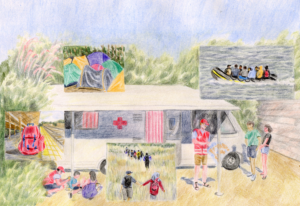
Description
Online Disaster Surveillance for a better field deployment.
Context
The Singapore Red Cross launched a Disaster Surveillance Team (DST) to monitor global natural or man-made incidents that may call upon the need of international humanitarian assistance. The DST will play a pivotal role in the decision for overseas deployments. Its 3 main missions are the following:
- To prevent delay in deployment of personnel due to influx of information and drawing up of situational report (SITREP);
- To promote constant and active monitoring of incident when called upon, along with increased situational awareness in the global context;
- To procure credible information of quality that will assist Staff in preparing a deployment plan.
The purpose of DST is to empower volunteers and members to be part of Singapore Red Cross’(SRC) decision-making framework, to lead team mobilisation and capacity building of Staff and Volunteers.
Volunteers and members of DST can monitor disasters and submit reports remotely online, meaning they do not have to be physically present at a venue to accomplish the work. This form of volunteering allows us to be able to continue engaging our volunteers in the midst of the COVID-19 pandemic where people are encouraged to stay home. It also enables us to engage with volunteers who have heavy commitments for their day jobs and yet still want to avail some of their time for volunteering.
Technical details & Operations
Monitoring
The volunteers daily monitor online information on disasters in countries or regions under their care and submit a Situation Report.
The “disasters” are natural or man-made and require humanitarian assistance. The focus is on earthquakes, landslides, tsunamis, volcanic activities, floods, extreme weather, hurricanes or typhoons. Avalanches, droughts, wildfires, epidemics, conflicts, famines, displaced populations, industrial or transport accidents are also monitored.
The information sources are GDACS, USGS, Relief Web, AHA Centre, GeoNet, news media such as BBC, national weather monitoring bodies, etc.
Daily Reporting
The team must verify the available information on disasters that occured in the countries and regions under its care. The team submits its report via Google form that has the following format:
- Time of incident: Local date and time (UTC XXX);
- Nature of incident: Description of event (location, coordinates, event statistics, what happened, etc.);
- Number of people affected (fatalities, injured, displaced, etc.);
- Political concern;
- Security issues (if any);
- Sources: Web links to information sources;
The report discusses one event per country. The reporting deadline is 18 00 UTC +8. The person in charge must inform that the report has been submitted on the WhatsApp Group. Staff may request for a fuller report on a particular disaster which would be shown to SRC’s management for decision-making on whether to respond to the disaster or not. Please refer to a sample report.
OpsWatch
OpsWatch stands for “Operations Watch”. The service monitors safety & security of overseas missions. It includes:
- Advice on safety & security matters (Admin instructions, mission briefing, on-the-ground);
- End-to-end mission tracking;
- Risk monitoring, forecasting & reporting;
- Emergency contact & support.
Deployment & Impact
Every 3 months, volunteers who have attended the quarterly briefing and have indicated their interest to be part of the DST would be assigned to one of the 5 following teams:
Team 1 – Northeast Asia, Central Asia;
Team 2 – Africa, Middle East;
Team 3 – South Asia, Oceania, Europe;
Team 4 – Americas, Southeast Asia;
Team 5 – Information consolidation (weekly reporting of disasters monitored by teams 1, 2, 3 and 4).
Once volunteers have been assigned to their respective teams, they will be allocated specific slots in a 3-month duty roster. Members of the team would have to highlight if they are unavailable for specific dates in order for team leaders to arrange for other members to fill their slots. When the duty roster has been finalised, team members can still swap duties with other members within the team via the WhatsApp Group.
Information collected by DST volunteers will be used by SRC staff to draw up reports on disasters, and to prepare deployment plans. The information collected may also be presented to SRC’s management who will then decide the form of response that SRC is taking for a particular disaster. Hence, submitting accurate information is crucial and team leaders are responsible for vetting the quality of reports that have been submitted.
In times when SRC deploys disaster response teams to other countries to work with National Societies on relief aid and needs assessment, a DST volunteer may be requested to provide OpsWatch services to the disaster response team. This helps to ensure that the disaster response team reports back via WhatsApp or any mode of communication in a timely manner from location to location. The DST volunteer who is on duty for OpsWatch should also report daily disaster incidents of the specific country in the group chat.





